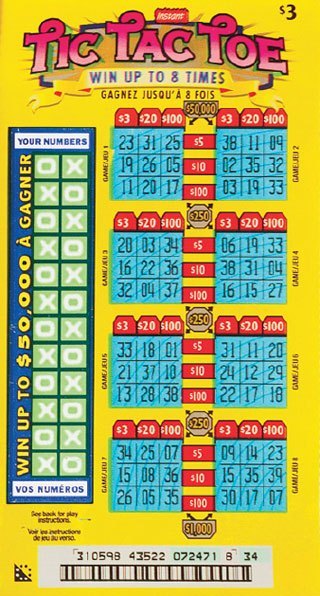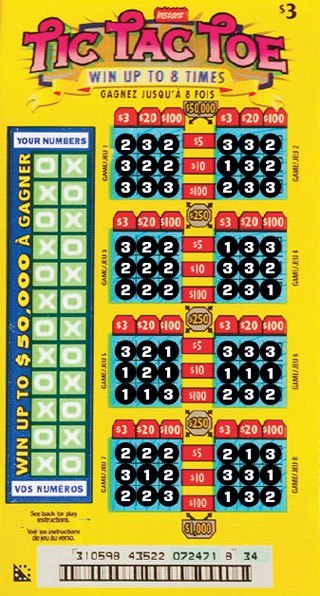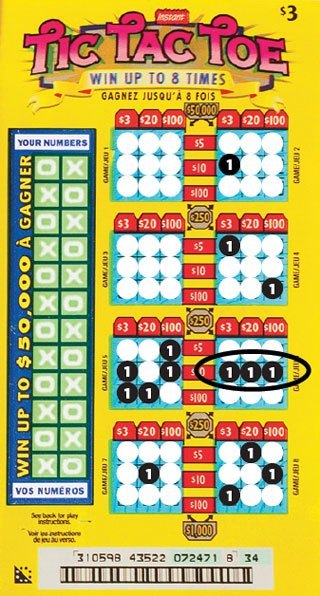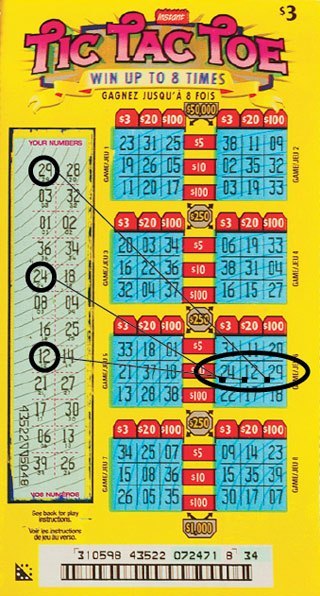Is the apparent randomness of the scratch ticket just a facade, a mathematical lie?
The call came around 3 a.m. Toronto time, which was midnight in Nevada where Doug Hartzell was sleeping. It was his old friend, Mohan Srivastava, phoning from Canada.
"He called me and said, 'Man, I think I'm losing it. But I see a pattern in scratch lottery tickets,' " said Hartzell, recalling that 2003 conversation.
"My reaction almost instantly was like: I'm sure he's right."
Over their three decades of friendship, Hartzell has come to accept that Srivastava is simply smarter than most people. So when the 52-year-old geological statistician told him he could identify a winning scratch lottery ticket — without the use of pennies or fingernails — Hartzell believed him.
"There's been so many things he's done that after the fact, people go, 'Oh yeah, why didn't I see that?' " Hartzell said. "But Mo has one of those rare minds."
Most people see a random jumble of numbers when they look at a scratch lottery ticket like Ontario's "Tic Tac Toe" game. But for Srivastava, he saw that certain numbers appeared only once in the grids — and when these "singletons" lined up three in a row, chances were the ticket was a winner.
He calculated this held true 95 per cent of the time and notified the Ontario Lottery and Gaming Corp. Within days, they pulled the game — the first time in OLG history a recall was prompted by a customer-identified flaw.
At the time, Srivastava's discovery went largely unnoticed but today, the reserved but genial scientist is enjoying a brief moment in the spotlight after appearing in this month's issue ofWired magazine. In the article, Srivastava discusses what he considers flaws in the lottery industry and, at the magazine's request, conducts another test of his code-busting logic. He chose 20 tickets currently on sale in Ontario, predicting six would be winners. Four of them had payouts.
The odds of this happening are about one in 50, Srivastava told the Star, which is "pretty unusual."
"I think there is still a problem," he said.
As Srivastava's name now makes the rounds in the blogosphere, he is being touted as the statistician who outsmarted the government, the game and the multi-billion dollar lottery industry.
Srivastava insists others could have arrived at the same discovery he did, and chances are others have. But for Hartzell, his friend is the one who pulled it off — and tried to fix the problem to boot.
"Theoretically, someone else could have figured it out but the short answer is, Mo's the one that did," Hartzell said. "He's a numbers theory guy, he likes puzzles . . . (and) when he stumbles across these things, he can't put it down."
The son of a Scottish homemaker and an electrical engineer from India, Srivastava admits he was a nerd growing up. As a high school student in Elmira, Srivastava spent many a lunch hour upside down in his locker, stuffed there by the bigger boys.
"I was a geek," he says cheerfully.
After receiving degrees from MIT and Stanford University, Srivastava began a career as a geostatistical consultant, helping international mining companies determine where to point their drills.
His job entails using data to extrapolate how much wealth might be buried underground. For Srivastava, the skills he uses for work are the same ones he applied to cracking the Tic Tac Toe game.
But it was also "a happy coalescence" of other experiences that helped Srivastava arrive at his lottery epiphany. First of all, there was the computer class he took in high school; one of his assignments was to write a computer program for none other than tic tac toe.
Curious by nature, Srivastava also had a natural interest in cryptology, one further reinforced by his friendship with mathematician William Tutte, a British codebreaker who cracked a high-level Nazi code during World War II.
"I had a way of thinking about (the lottery ticket) like a message," he explained. "And whether it's a winner or not — that was the message."
All these factors came into play in June 2003, when Srivastava scratched his first lottery ticket, given to him as a gag gift.
He won $3. After a momentary wave of "child-like joy" subsided, the gears in his brain began to click.
"I started wondering how they're produced," he said. "By the time I got to the Petro-Canada (to redeem the prize), I knew how I would write the computer program."
Srivastava thought this was the end to his ponderings. But later, walking past the same Petro-Canada, he heard a voice in his head: "But if you do it that way, if you program it that way, there will be a flaw in the game," he said. "After that, I knew the trick."
Srivastava bought a few more tickets and saw that the computer program behind these Tic Tac Toe games also produced the same flaw. He bought 25 more tickets over the next few days, all from different stores, to reassure his inner statistician that this was more than just a fluke. It was.
Naturally, Srivastava spent some time at this point determining how he could profit from his newfound insight. A quick calculation showed this would be more hassle than it was worth.
"I realized this wasn't going to be a big payout," he said. "Once I realized that this wasn't a pot of gold at the end of the rainbow, I was like, 'Who do I report this too?' "
Srivastava eventually connected with the OLG but they kept brushing off his concerns. So he decided he would show them the problem in a "live test."
Srivastava bought 20 tickets and tied them, unscratched, into two bundles — the winners and losers. Just in case the rubber bands broke and the tickets got mixed up, he wrote a cover letter listing the serial numbers of each ticket and what his prediction was for it.
He couriered the package to the OLG. At this point, he finally felt free of the obsession that had gripped his imagination for days.
"I remember dropping them off and actually feeling that sense of this whole thing bleeding away," he laughed. "I was like, let it go. This is about as crazy as it gets."
But two hours later, he got a phone call. It was a member of the OLG's security team.
"The first thing he says is, 'We need to talk,' " Srivastava recalled.
Within days, the OLG pulled the game from their 10,000 retailers. Srivastava spent the next few months testing other lottery tickets from around North America, inputting data into spreadsheets and trying to determine how systemic the problem was. In 2007, he notified the OLG of a second scratch ticket that was possibly flawed, the popular Super Bingo game. The ticket was recalled as a "precautionary measure" and an independent audit was unable to prove it could be broken, said OLG spokesman Tony Bitonti.
In the end, he said, none of the lottery corporations or ticket printers were interested in fixing the problem he identified. The issue was brushed off as a "fluke" and one American ticket printer even threatened him with litigation, he said.
Today, Srivastava says it's quite likely flawed tickets are still on store shelves. He sees potential for greater consequences —evidence suggests flawed lottery tickets are being exploited for money laundering — and is confused by the lack of will to remedy a problem he helped identify.
"If there are some people that are skimming winners, or more able to skim winners, what that means for everyone else is they're getting more losers," he said. "There's kind of a cruel unfairness for the people left over who weren't in on the trick."









Even if someone figured out which tickets in a roll were more likely to be winners, they couldn't buy them out of the middle of a row of tickets unless they were a clerk or store manager selling them and waiting for the winners to come. And even if they were smart enough to spot such a flaw in the design of the tickets, they would probably (as he suggests) have a more profitable way of making a living.
"...the lottery corporation needs to control the number of winning tickets. The game can't be truly random. Instead, it has to generate the illusion of randomness while actually being carefully determined."
The system is slowing unraveling, but the industry is here to stay! It will just get more clever.
I have lost everything i got on the lottery. I know I'm gonna get them oneday. The lottery is a rippoff pplz. I regret that played
I'm going to play until i get mine and i know i will get mine soon, and very soon,cant wait
I never liked those scratch games with the exposed elements, these "extended play" games like crossword, bingo and tic-tac-toe.
Mainly because it took too <snip> long to figure out if you won! And that translucent blue covering over the letters was sticky and messy, unlike the dry scratch off for regular scratch games that brushes away. Played them couple of times and then never again.
Now with this report, I have one more reason to hate those types of scratch-off games, the higher potential for fraud.
Retailers here have trays where they rip tickets from the roll and put on display for sales so the customer picks what ever ticket he wants.
So the customer never sees the roll.
I agree, I can only wonder what kind of turmoil will be created as people go to buy scratchers, when this gets around , and it will ,we know now.
A store owner or a clerk would have access to the tickets and remove what they believed to be the winning tickets and sell the rest. They would know amount of the prize and wouldn't buy the free tickets or tickets that paid off in equal value and sell them to customers. If their method had a 60% accuracy rate, they would make a nice profit.
"And even if they were smart enough to spot such a flaw in the design of the tickets, they would probably (as he suggests) have a more profitable way of making a living."
It would depend on the sales volume of the store but remember when the Ohio Lottery replaced Super Lotto Plus with Lot 'O Play because their Bingo scratch-offs were so popular. Those Bingo tickets had the same design as the tic tac toe games in the article. I don't know about making a living but a clerk or store owner could have supplemented their income nicely.
Many state lotteries are using vending machines and maybe because they knew that problem existed. They may have instructed their retailer not to buy back unscratched tickets too.
The scandal would be acknowledging their games were flawed and this way they could quietly go about their business as if it never happened.
Random does not exist, it just seems like random when we don't know all the details. I think I heard
this somewhere before.
RL
The stores around here sell scratchers right off the roll from clear plastic display cases. ALL of the "YOURS" and "THEIRS" numbers on the ticket are covered, and I've never seen anyone try to buy tickets out of sequence.
Best line:
Srivastava: "People often assume that I must be some extremely moral person ... I can assure you that that's not the case."
That's what you want to hear from a statistician. He has a future career in calculating gov't CPI numbers.
You can't buy tickets out of sequence here. Also, in Indiana, store owners and employees are not allowed to purchase tickets from their place of employment. They have to go to another store.
Then there is the less complicated embezzlement strategy.
I'll read the article later as it's rather long, but from the pictures it looks like you'd have to not only buy but also scratch off half the ticket in order to see if you've won or not... so how is this "cracking a code"? I could see it as that if it allowed you to figure out a ticket was a winner without having to scratch anything, but not when it's something like the pictures suggest.
To me, this is just another reason not to buy scratch off's.
I'm in New York, and I've never seen anyone get to pick which individual scratch off ticket they want to buy. Scratch-off tickets are in a clear plastic display case and the clerk simply tears off the next available ticket and hands it to the customer. Retailers buying back unscratched tickets? Not saying it cant happen, but I've never seen it.
All of that said, I'm sure the guy featured in the article did expose the flaw. But he's probably one of a very select few that could actually spot it. He's a very atypical player.
It looks like this would only work with extended play Bingo type tickets, there would have to be info on the ticket before scratching.
Then you would have to have time to sit there and analyze the ticket. I don't see anyone with that kind of time or clerks letting people behind the counter to stand there and look at tickets. Also, can't buy tickets out of numerical order or return unscratched tickets that I have ever seen, so nice story but nothing that seems like it would help me win more.
Either way, the Lottery is making millions/billions and only a few lucky people get a win every now and then. The odds are stacked but if I set the budget and just throw my hat in the ring knowing that money is just allocated to be spent on the 1 in a million chance to get the big winner.
Need more raffles and I don't see why Lottery doesn't allow for more prizes/more winners. It seems like as the odds have gotten worse the ticket sales are going down some.... but not enough for them to change back to better odds. Maybe we need to boycott tickets for a year until they go back to 1:1.95
__________
Must be in to win!
The ability to look at the THEIR NUMBERS side of a ticket and predict with high accuracy whether or not there will be a prize won on the YOUR NUMBERS side may make for a neat party trick (so does knowing all the words to We Didn't Start the Fire or It's the End of the World as We Know It) but it's not something that can be done BEFORE a ticket is purchased (i.e. before your money is spent).
I can look at the drawing results and tell you how you should have marked your playslip.
Well, it's great that Srivastavia's consulting business earns him more than $200K per year annually!
Isn't it a shame that even after all his work, he still couldn't get the Ontario Lottery's Security Division to hire him on as another of their high-paid outside consultants?
No they couldn't buy them out of order, but they could buy all of the tickets to get at them, assuming they thought it was a big enough winner. My favorite game used to be a scratch off named Holiday Gifts. I started keeping detailed statistics about every ticket from every roll that I purchased. For the longest time, I was making a consistent profit, and buying winners at the rate of 1 out of every 2 tickets I bought at that store.
It was a relatively slow store, and I simply let other customers buy the tickets I did not want. I would go to the store a couple of times a day, sometimes more, sometimes less, and I would keep track of what had been sold. I bought when I thought there should be a winner, and I was right 50% of the time. The overall odds were 1 in 3.99, but I was winning at half that rate. The three largest wins were $150, $75, and $40. Not too bad for a $5 ticket.
Then things changed. Instead of picking with good accuracy tickets that paid $10-$20 on average, I started getting a bunch of winners of free tickets, and winning less frequently. I quickly started losing money, so I quit playing that game. I purchased somewhere between 125 and 150 of those. Patterns do emerge sometimes, but even my system did not make me a fortune, just a constant trickle of winners. It was a break even game, but I won at twice the posted odds. That is the only reason that I did so good at it.
There is one store that I play at that has those video poker games in the back, along with tables that folks sit at and smoke cigarettes and scratch tickets and fill out online slips. You could sit back there and watch a customer scratch a number of losers, then go in and buy a ticket out from under him. It happened to me once there, and I lost several hundred dollars that day, and to this day I still think I could have made a good chunk of that back. After all, I had scratched a bunch of losers. I think they were pros. They left quickly after I discovered the next ticket in the series missing. Was it a winner? I don't know for sure, but I bet it was.
What you are talking about is "poaching" for tickets. Its one of the few successful strategies in playing scratch offs were a person observes another buy several losing tickets in a row and then swoop in and buy 1 or 2 themselves with an increased chance of winning. I have done this once and I hit 2 for 2 and got a $70 profit in 5 minuets.
The story was an interesting read but I would not call it cracking the lottery. A number or letter can appear more then once and still win. However it does increase your chance of winning. That is what all us players look for right ?
Cracking the algorithm code on the serial numbers is the only real way to crack the lottery. Finding out where the big winners are located is the most important factor of all.
They can think that all of those folks who play scratchers are dumb if they want to. I know people who actually study those things and WIN most of the time. They don't play numbers and they don't play the scratchers everyday. I tried once to see how a couple was doing it but they tend to keep that information very, very secret. They used to do the same thing with pull tabs. The people who make these games are making a big mistake..just because you are poor, that does not mean you are stupid.
As far as laundering money goes, its gonna get laundered one way or another. The lottery is an ideal way for money to be cleaned. I think the games P3 and P4 are where most of the money laundering takes place. You get a straight number or boxed and get paid on the spot. New money!
Most of the money laundering occurs when criminals purchase tickets that have already won and claim them themselves. There is no guarantee you will hit P3 or P4
There is a sad reality reported in this story too:
"While approximately half of Americans buy at least one lottery ticket at some point, the vast majority of tickets are purchased by about 20 percent of the population. These high-frequency players tend to be poor and uneducated, which is why critics refer to lotteries as a regressive tax. (In a 2006 survey, 30 percent of people without a high school degree said that playing the lottery was a wealth-building strategy.) On average, households that make less than $12,400 a year spend 5 percent of their income on lotteries — a source of hope for just a few bucks a throw."
I think the part about high school dropouts can be mis-interpreted. It's not like they dropped out because they thought they'd win the lottery, but I think it's simply people who dropped out of high school (whatever the reason) simply see the lottery as their only chance at being wealthy (and in my experience of people I knew who dropped out of high school, that's probably true as most had issues with drugs, gangs or other criminal activity).
I also find it ironic that in playing the lottery those people are giving money to the state to fund the very thing they abandoned.
If you haven't noticed, the state lotteries are now utilizing the science of color to make the panels more difficult to play to those with even slight vision impairments, especially the 50 and over crowd whose vision is beginning to naturally deteriorate. By color science, I mean the strategic placement of adjacent colors on the panels that send a confusing message to the brain (it has been proven that staring at certain shades of red and blue alternating rapidly in a strobe-like effect can quickly cause headaches in migraine sufferers, for example). You can imagine how many winning tickets might be thrown away as they get better at it, which is the obvious goal. To see what I mean, look at Florida's $3 Orange Crossword Tripler.
really enjoy stories like this.i think a lot of us feel if we had a certain amount of time and resources we could crack the code.
it happen 2 mehere in jersey city they played ajoke on me and i almost had a heart attack...........
I sure similar statistics could be found about drug users, drunks and smokers. Dysfunctional people participates in lots of activities to excess.
That was one long story. If he was a trash man and made that discovery, would anyone listen or care? Or would they be laughing and tell the other
side of the story which is - to do what this guy is suggesting can be done (although he did change his mind and kept his job) a person would
have to have access to books and books of tickets, time to study them, time to choose which they were going to buy and then scratch them off to
win $10 at a time? They would also need the time to travel to other stores looking through endless books, have permission to do so from store
owners, scratch the ones they chose to find out if a 70% success rate still held true...it does not make a whole lot of sense to me. In fact, for
one person to accomplish finding a top prize by charting patterns on scratch offs, makes no sense to me. Just buy a darn ticket and hope for the
best. This whole thing started because he won $3? That's just plain assinine for a hundred reasons. If I cracked a code, I sure wouldn't want
it to be the one winning $3 and $10 at a time. And, what if the top prize is 50 miles away from his starting location? How many stores can
one person hit and how many years would that take? Probably just enough for the game to end because someone else found all the top prizes
before he did. Just because the guy can find gold doesn't mean he can find the big one. Wow, let me get back to my numbers...or anything
Just because the guy can find gold doesn't mean he can find the big one. Wow, let me get back to my numbers...or anything
at all that makes any sense. I think I'll go and see what pumpi has to say lately.
good point, I wouldn't buy a loose scratcher from a clerk, I would but one from a vending machine.
This is old news. I discovered the code on scratchers a few years ago when I was working in a gas station in South Carolina. I still don't play them though.... I'm not a scratcher person.
I agree with you!
LOL Makes me scratch my head, He cracked the code for 3 dollars, at least magathing got 7 dollars.
Well I have no idea if you are serious or not, but if you think you really have, I would love to hear it. I am a scratcher person.
I don't think it would be a good idea to share something like that........besides it takes away from the winning experience. Just play for chance like everyone else and don't cheat. Cheaters never get very far anyway.
Besides......the specifics for your state may be different than the ones I have noticed the pattern with........
Actually the scratcher games for SC and TN are not that different (neither is GA).
So we would be interested in hearing some pointers you say you have discovered...besides, they probably arent as secret as you may think.
I grew up in SC and have family there still, so I go back fairly often while living in TN. I travel through GA so I have been able to compare many of the scratch offs.
It's not cheating if you're just smarter than the other players, besides any win is thrilling even if you have an advantage.
After reading this article, I don't think I'm nuts about something I've noticed here in PA anymore. On the $5 Crossword game (and quite possibly the $3 one), if any of the words on your crosswords has the letter "Q" in it, you win (or at least break even.). I don't think I've lost when I've had the letter "Q" in any of the words in the crosswords.